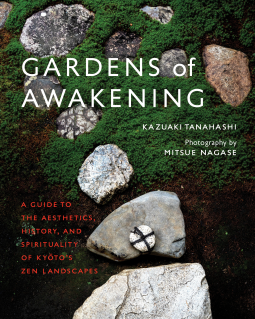
Gardens of Awakening
A Guide to the Aesthetics, History, and Spirituality of Kyoto's Zen Landscapes
by Kazuaki Tanahashi
This title was previously available on NetGalley and is now archived.
Send NetGalley books directly to your Kindle or Kindle app
1
To read on a Kindle or Kindle app, please add kindle@netgalley.com as an approved email address to receive files in your Amazon account. Click here for step-by-step instructions.
2
Also find your Kindle email address within your Amazon account, and enter it here.
Pub Date May 07 2024 | Archive Date Apr 30 2024
Shambhala Publications, Inc. | Shambhala
Talking about this book? Use #GardensofAwakening #NetGalley. More hashtag tips!
Description
Imagine yourself in Kyōto, Japan, gazing at an ancient temple garden. How would you contextualize what you are seeing? What is the history of this centuries-old contemplative art form of Zen gardening? What are its symbols and concepts?
Richly illustrated with full-color photographs, Gardens of Awakening guides you through a series of Zen temple gardens, most of which were created from the fourteenth through seventeenth centuries. Some are teeming with plants and flowing water, while others have only rocks and sand. All share in the Zen aesthetics of awakening.
Through essays and commentary on Mitsue Nagase’s striking photographs, beloved Zen artist and translator Kazuaki Tanahashi presents the gardens in terms of seven qualities that arise from Zen practice: direct, ordinary, vigorous, gleaming, pivotal, nondual, and inexhaustible. Relating these qualities to the development of Zen culture and its influence on Japanese art, Gardens of Awakening invites you deep into the heart of Zen.
Advance Praise
“This gorgeous book reflects the rare and beautiful art of gardens in Japanese culture. A treasury of insights and images that will inform and delight the reader and viewer.”—Joan Halifax, author of Being with Dying and Standing at the Edge
“At heart, Kyoto is a city of gardens; many are centuries-old and masterpieces of Zen principles and aesthetics. Countless books have been published about them, yet this one is quintessentially different. Here, these gardens are interpreted through Tanahashi’s life experience—his practice of Zen, his deep knowledge of temple and garden history, and, most significantly, his own unique view as an artist. Supporting his chosen aspects of each garden are the clear and beautiful photographs of Mitsue Nagase.”—John Einarsen, founding editor of Kyoto Journal
“Remarkable in scope and breathtaking beauty, the writing and photographs in Gardens of Awakening transmit the ineffable and timeless serenity, stillness, and wonder in the incomparable Zen gardens of Kyōto. The combined expressive talents of Tanahashi and Nagase help readers to awaken these same qualities within themselves. Complete with Tanahashi’s exquisite rendering of the historical intertwining of Zen gardens, aesthetics, and art, there is no other book on the subject quite like this. What a gift!”—Peter Levitt, cotranslator of Yin Mountain: The Immortal Poetry of Three Daoist Women and author of Fingerpainting on the Moon: Writing and Creativity as a Path to Freedom
“Whether you are new to Zen or a longtime student or practitioner of Buddhism, you will cherish Gardens of Awakening. With a rare combination of high erudition and charming familiarity, Kazuaki Tanahashi displays an intimate knowledge of Japanese Buddhism and aesthetics in general, and of Zen in particular. Beyond mere knowledge, however, the pairing of Tanahashi’s text with Mitsue Nagase’s exquisite images is itself an invitation to awakening. In the quiet heart of a clamorous world, there is a garden of gardens. Let this book take you there.”—Sean Kelly, author of Becoming Gaia: On the Threshold of Planetary Initiation
“Gorgeous words, generous photos. Walk in the mind garden, Zen garden, Japanese garden. All the same in this wonderful book. Transforms how to think, not grasp, not two, not one, at peace with it all. Thank you, Kaz and Mitsue. We all bow.”—Natalie Goldberg, author of Three Simple Lines: A Writer’s Pilgrimage to the Heart and Homeland of Haiku
Available Editions
| EDITION | Other Format |
| ISBN | 9781645472056 |
| PRICE | $26.95 (USD) |
| PAGES | 184 |
Available on NetGalley
Featured Reviews
 Stephanie M, Librarian
Stephanie M, Librarian
This book beautifully captures the history and the scenery of Zen gardens. It is a creation of word and nature, crafted into a book suited for a coffee table centerpiece. I would recommend this book for ideas on traditional Zen gardening, and how best to apply those practices to your own personal Zen space.
A beautifully laid out book, there are quotes, history, mindfulness, and the photos practically leap off the page in their stark attractiveness.
I loved looking through, and then reading this one.
Would make an excellent gift or coffee table book. Recommended.
Thank you to Shambhala and NetGalley for the DRC
I loved everything about this book. I have always enjoyed Japanese gardens but this book was educational. This book takes you way beyond the garden explaining symbols throughout centuries. Very enjoyable!
 Reviewer 1295824
Reviewer 1295824
I received a copy of this from NetGalley.
There are some really beautiful pictures of Japanese Zen gardens in this book. However, I'd recommend this book more to people wanting to know a brief history of China and Japan with regards to the gardens and the time period in which they were created and how the elements of Zen Buddhism relate, rather than someone looking more for a deep analysis of the gardens themselves.
One thing anyone can appreciate about Japanese Zen Buddhism is the gardens and the wonderful beauty of their designs in connection to nature. Kazuaki Tanahashi offers an excellent perspective of how enlightened people manifest their sharp acuities about their surroundings.
Gardens of Awakening includes diagrams through the power of description. The picture allows the readers into the sacred spaces of great thinkers, designs, and practitioners. Exactness and refinement are shown in the landscapes, and Tanahashi gives more details of the logic behind the approaches to manicuring the landscapes. The traditional practices of Zen Buddhism are essential to understanding the motivations of the landscapers. Tanahashi provides in-depth explanations and backgrounds.
Thank you, Net Galley and Shambhala Publications for this Advanced Reader's Copy.
Readers who liked this book also liked:
Deborah Coolhart; Jayme L. Peta; Rylan Jay Testa
Self-Help, Teens & YA


















